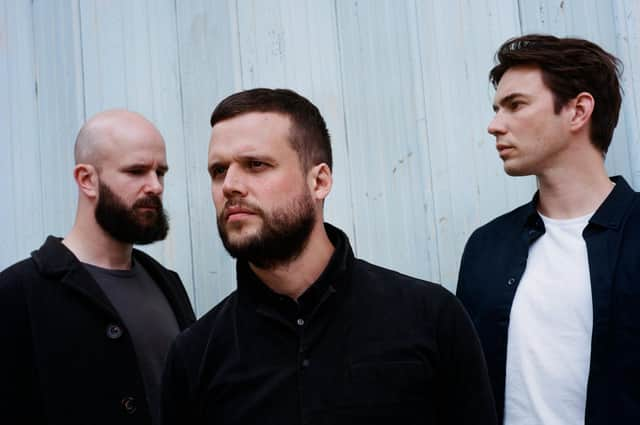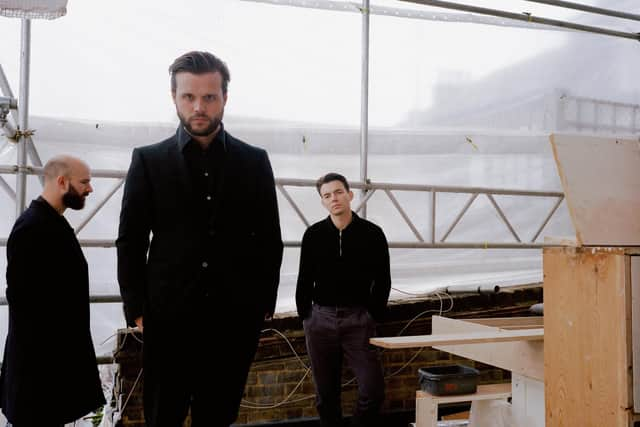White Lies: ‘There’s something to be admired about that golden age of prog’


“Obviously we’ve learnt a lot along the way,” says lead singer and guitarist Harry McVeigh, conceding how acutely aware he and bandmates Charles Cave and Jack Lawrence-Brown still are of the need to stay on their toes as songwriters.
“One of the hardest things to do is write something musical that you’re willing to share with the world and not feel embarrassed about, so we spend a lot of time making sure the songs are good,” he adds, “with the exception perhaps of our second album (Ritual).
Advertisement
Hide AdAdvertisement
Hide Ad“That’s one album where we went a bit adrift because we focused a lot more, to my ears, on trying to make everything sound really good and do crazy things with the production, how you record instruments and stuff, but not actually have the songs to back it up.
“Since then we’ve always made sure we have the songs before we think about anything in terms of the production, what crazy things we can do. That stuff is really fun but it only really works if you have the songs in the first place.”
Back in 2011, when White Lies made Ritual, they were saved by the fact that the album contained Bigger Than Us, which has gone on to be one of their most popular songs. “We were so lucky,” McVeigh says. “It just kept us afloat and it’s probably the reason we’re still here.”
At its most expansive, White Lies’ new album As I Try Not To Fall Apart recalls the ‘Big Music’ of Simple Minds, U2 and the early incarnation of The Waterboys. While McVeigh says the band aren’t thinking of their live show when they are writing songs, they do have a fondness for “a lot of that music that projects and has a big sound”, something he thinks is especially true of Simple Minds.
Advertisement
Hide AdAdvertisement
Hide Ad“It’s not like an American stadium rock thing,” he says. “There’s something very British about that big sound and it works so well on a big stage, but we’re just admirers of that sound in general and we always have been, ever since we started. That’s something that we’ve always done and probably always will do.”


Another unabashed influence is progressive rock, particularly from the “golden era of the 70s”. McVeigh cites bands such as Yes, Rush, Caravan and King Crimson.”
There is something I think that pretty uncool about it,” he admits. “If you mention all of those bands, the majority of their music will be unlistenable, but when it’s really good it’s so perfect, it’s some of the best rock music that’s ever been made.
“And I think we’ve always loved the ethos of the 70s, it was a time where the music industry was starting to make loads of money but it was still run by people who were music visionaries who were really keen to push boundaries and do things that hadn’t been done before. All of these crazy bands that were making music that would never have been considered mainstream but they’re hiring orchestras and getting all these amazing musicians in to play these incredibly intricate parts, and I think there’s something to be admired about that golden age of prog. It’s something that we definitely aspire to. We don’t have the budget to do it onstage but we can emulate the sound.”
Advertisement
Hide AdAdvertisement
Hide AdDrummer Lawrence-Brown has pointed to the album’s title track as being the poppiest song they have ever written and a track that could define the band’s next chapter. Today McVeigh explains that where previously they would have been “more self-conscious” about channelling their songs from demo stage into “something that sounds like White Lies, taking elements of whatever we’ve done before and putting them into what we’re working on to solidify the sound of the band”, these days they are more laissez faire.
“I don’t really know why we’ve done that, it feels more interesting, I guess,” he says. “It’s fun to try a lot of different things out. If you feel you can get away with it then it’s great. I think this album, perhaps more than any of the others, has that. A lot of the songs pull in very different directions from each other and there’s a lot of variance over the album, I think that probably is the future of what we’ll be doing. I think our albums will always be like that now.”
Elsewhere, I Don’t Want To Go to Mars muses on the space race between billionaires Elon Musk, Jeff Bezos and Richard Branson. McVeigh it’s “a bit of an outlier” from the more serious meditations on mortality in the rest of the album. “It’s really taking the mickey out of the whole idea of how glamorous it might be to live on Mars; the reality is it would be awful,” he says. “It would be colonising an uninhabitable planet, it would be freezing cold and you would never be able to go outside, you’d have to live your whole life basically working to survive, so Charles was writing a song about that. It’s always sold as the space race is a glamorous thing but in fact it’s sort of awful. Obviously he White Lies-ified it by making it about an individual talking about how much he dreaded going on that journey, how much it’s tearing him up inside. I guess it is a bit of a rebuke to that whole space race thing, Elon Musk and all that stuff. I think it was just written because that was in the news. During the pandemic as well there was a lot of doom mongering amongst everyone, people were thinking that was potentially the only option. That Don’t Look Up film as well came out at a similar time.”
This year marks White Lies’ 15th anniversary, although all three members previously worked together in the band Fear of Flying. McVeigh says he has thought “a lot” in recent times about the band’s rapid ascent to the top of the charts less than two years after they decided to defer their university studies to concentrate on music. Back in 2007-08 their contemporaries included Florence + The Machine.
Advertisement
Hide AdAdvertisement
Hide Ad“I do find it strange that there’s nothing to prepare you for that,” he says. “We were not even a year out of school and we’d started to think about signing a record deal and getting an album together and at no point did anyone say ‘this is what to expect if it goes well and this is what to expect if it goes badly, and this is what will be demanded of you if you’re really successful’. That first year of touring we did 150 shows, which is kind of madness, and if we were handed a schedule like that now we would blankly refuse to do it because it’s too much. Back then, you’d just take everything on, you’re so young and chomping at the bit, but it was a lot in hindsight and it takes a hit of time to adjust to it.
“I think we were lucky, and maybe it’s the case with everyone if you’re in a band you’re facing it together, you’ve got each other to fall back on and you can help each other out. If you were doing it on your own the pressure would be immense, thinking of people like Florence. There’s no mental health check or anything like are you capable of handling this pressure? It’s definitely a strange experience, very wild at times, but I’m glad that we got through it.
“The fact that we’re still going is testament to our friendship more than anything else.”
As I Try Not To Fall Apart is out on Friday February 18. White Lies play at Leeds University Stylus on March 16. www.whitelies.com
Comment Guidelines
National World encourages reader discussion on our stories. User feedback, insights and back-and-forth exchanges add a rich layer of context to reporting. Please review our Community Guidelines before commenting.